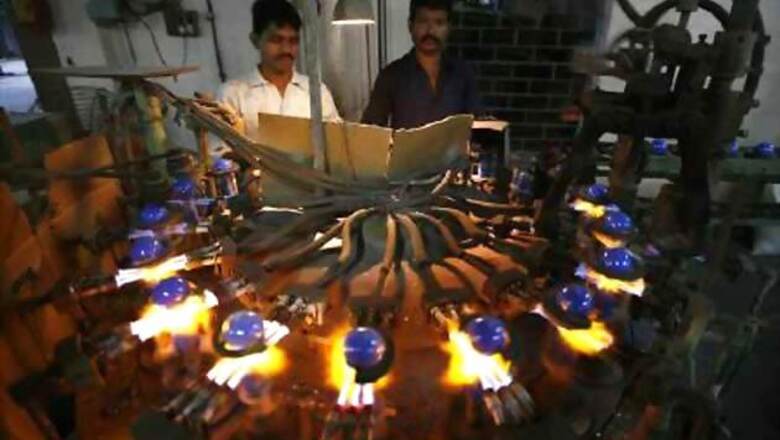
views
New Delhi: India's industrial output shrank in November after a spurt the previous month, denting hopes of a recovery in economic growth and strengthening the case for an interest rate cut later this month. The index of industrial production fell 0.1 per cent annually in November, data released by the Central Statistics Office showed on Friday, compared with revised growth of 8.3 per cent a month ago.
The outturn was even worse than the 0.7 per cent growth a Reuters' poll of analysts had predicted for November. Output was depressed by weak investments as well as the Diwali holiday, which was in November 2012, whereas in 2011 it fell in October. Diwali is one the biggest Hindu festivals in India, with many factories shutting for several days.
"The correction in the November headline (industrial production) was largely priced in on passage of festive demand and manufacturers' possibly drawing down on inventories rather than stepping up production towards end-2012," said Radhika Rao, economist at Forecast Pte, Singapore.
Asia's third largest economy is on track to expand at its slowest pace in a decade for the fiscal year that ends in March, weighed down by a combination of weak investment and consumer demand. December trade data expected to be released later on Friday could add to the misery, as exports, which make up around one-fifth of the economy, have fallen against year ago in the previous seven months.
GDP growth that once looked set to hit double-digits has been stuck below 6 per cent for the past three quarters. The slowdown is worrying for the government as it prepares for a series of state elections and a general election due in 2014.
Previously pilloried for his government's inaction as the economy slowed, Prime Minister Manmohan Singh launched a series of reforms late last year to salvage a reputation made as the architect of India's economic liberalization in 1991.
On Wednesday, the government hiked railway passenger fares for the first time in nine years and it is also considering raising subsidized fuel prices. Politicians and business folk have pleaded for the central bank to reduce interest rates that are among the highest of the major economies.
The Reserve Bank of India (RBI) has left its policy repo rate unchanged at 8.0 per cent since April 2011, citing stubbornly high inflation, but has signalled it could cut in the January-March quarter. Inflation numbers for both wholesale and retail prices are due to be released on Monday and should provide crucial input for the RBI's upcoming policy review on January 29.
"We are of the view that the Reserve Bank of India will definitely cut rates by 25 basis points, maintain a dovish tone, and a commitment to maintain liquidity in the comfort zone through open market operations," said Shubhada Rao, Chief Economist at Yes Bank, in Mumbai. According to a Reuters poll of analysts, wholesale prices probably rose an annual 7.40 per cent in December, faster than a 7.24 per cent rise in the previous month.
Consumer price inflation in the same month probably stood at 10.20 per cent, above 9.90 per cent in November, the same poll showed on Thursday. Several analysts believe the RBI should still have leeway to cut its policy rate if the uptick in inflation in December is not more severe, as inflation had been slowing in the previous two months.
Financial markets gave a muted response to the data. The benchmark 10-year bond remained flat at 7.85 per cent, while stocks retained their gains, with the Nifty is up 0.3 per cent.


















Comments
0 comment